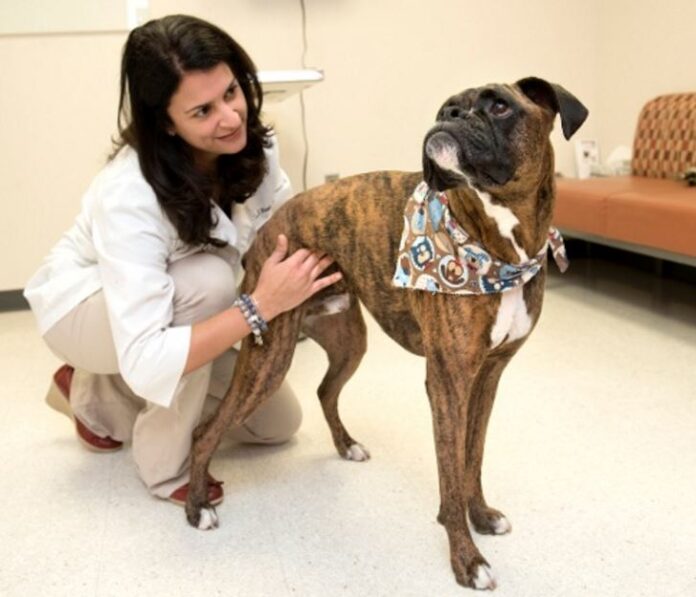
A 5-year-old boxer, with a habit of eating things he shouldn’t, has won a national competition for the most unusual pet insurance claim after swallowing a wooden BBQ skewer and having it removed at the Virginia-Maryland College of Veterinary Medicine at Virginia Tech nearly a year later.
After owner Valerie Mould of Princeton, West Virginia, realized that her dog, Curtis, had eaten the skewer during a family event to celebrate the birth of their daughter in 2014, she took him to a local veterinarian.
She was told to watch Curtis closely, but the following morning he vomited and collapsed. The family brought Curtis to a local emergency animal hospital, which referred him to the Veterinary Teaching Hospital in Blacksburg for treatment.
David Grant, associate professor of internal medicine in the Department of Small Animal Clinical Sciences, performed an ultrasound and endoscopy but he and his colleagues found no evidence of the skewer. Curtis spent two days in the hospital’s intensive care unit.
“No matter how hard they tried, they couldn’t find the skewer,” Mould said. “There were no signs that it punctured anything either, so they believed it had possibly broken down in his stomach.”
After more monitoring and tests, Curtis was sent home. A few months later, he became lethargic and irritable and lost his appetite. The Mould family brought Curtis to a local veterinarian several more times before returning to the Veterinary Teaching Hospital.
Grant and his colleague Kemba Clapp, assistant professor of radiology, found a baseball-sized mass between his stomach and pancreas. Marian Benitez, clinical assistant professor of small animal surgery, recovered the long-lost skewer while performing surgery to remove the mass.
“After nearly a year after ingestion, the body worked hard to wall off the wooden skewer by encapsulating it,” Benitez said, “the body as an organ never ceases to amaze me.”
With the skewer removed, Curtis returned to his old self. “Ever since he was healed, he’s been doing great,” Mould said. “He’s eating again and energetic. We are so happy to see that Curtis has his personality back.”
Afterward, Curtis was nominated by Nationwide for the 2015 Hambone Award, which recognizes the most unusual pet insurance claim of the year and is named in honor of a dog that ate a Thanksgiving ham while waiting to be rescued from being trapped inside a refrigerator.
Curtis received the most votes from the public during an online competition, beating out 11 other pets nominated for the award.
Because of his successful treatment at the Veterinary Teaching Hospital, the college also received a $10,000 Nationwide-funded award through the Veterinary Care Foundation to treat pets whose owners could not otherwise afford treatment.
“This was such an unfortunate experience for Curtis, but we hope that some good will come to other pets as a result of this recognition,” Mould said.
The runners up for the 2015 Hambone Award included a Persian cat that swallowed more than three feet of packaging tape and a miniature Dachshund that defended himself from a rattlesnake after eating the snake’s siblings.
Michael D Sutphin

